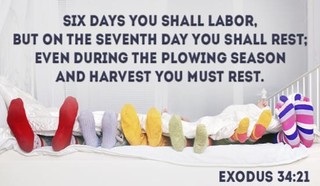Change Translation
- Recent Translations
- All Translations
Éxodo 34:29
Share
Listen to Éxodo 34:29
Settings
Scripture Text Size
El rostro radiante de Moisés
29 Cuando Moisés descendió del monte Sinaí, traía en sus manos las dos tablas de la ley. Pero no sabía que, por haberle hablado el SEÑOR, de su rostro salía un haz de luz.Éxodo 34:29 Meaning and Commentary
Exodus 34:29
FOOTNOTES:
F17 Seder Olam Rabba, c. 6. p. 19.
F18 (Nrq) "radios ejacularetur", Tigurine version; "in modum cornu radiaret", Munster, Fagius, "[vel] rediasset", Vatablus; "splendere instar cornu", Drusius; so <arabic> Karnon * in the Arabic language signifies the rays of the sun. * Golius, col. 1896. Castel. col. 3455.
F19 Vid. Diodor. Sicul. l. 3. p. 201. Macrob. Saturnal. l. 1. c. 21.
F20 Diodor. Sicul. l. 4. p. 212. so Orpheus calls Bacchus, (dikerwta) , Hymn. p. 126. and Horace ascribes to him, "cornu decorum", Carmin. l. 2. Ode 19.
And it came to pass, when Moses came down Mount Sinai,
&c.] Which was on the day of atonement, according to Jarchi, that is, the tenth of Tisri, or September; and so the Jewish chronologers F17 fix his descent on this day:
with the two tables of testimony in Moses's hand;
the two tables he carried up, on which God had wrote the law, called "the testimony", being a testification and declaration of his will to the children of Israel:
when he came down from the mount, that Moses wist not that the
skin of his face shone, while he talked with him:
the Targum of Jonathan is,
``Moses knew not that the splendour of the form of his face was become illustrious, which he had from the brightness of the glory of the Shechinah of the Lord, at the time he talked with him.''And this the apostle calls "the glory of his countenance", ( 2 Corinthians 3:7 ) the glory of the Lord as it passed before him, when in the cleft of the rock, and that degree of it he was admitted to the sight of, while conversing with God, during his stay on the mount forty days and forty nights, left a shining glory on his countenance; which while he was with God he could not be at all sensible of, the glory of God so infinitely surpassing that; and when he came down the mount, as he could not see his own face without a glass, so though the rays of light and glory that darted from his face were so bright and strong, that they might have been observed by him, yet his mind was so intent on what he had seen and heard, that he took no notice of them. The Vulgate Latin version renders it very wrongly, "that his face was horned", which has given occasion to painters to represent him in a ridiculous manner, as having horns coming out of his forehead; though the word has the signification of an horn, and the meaning of that version, as of others, may only be, that the skin of his face "darted out rays" F18 like horns, such as the rays of the sun appear to be like to the eye, see ( Habakkuk 3:4 ) hence Jupiter Ammon, the same with the sun, is described as having horns F19; and so Bacchus, who is supposed to be the same with Moses, is represented as having a horned face F20. Now this glory was left on the countenance of Moses, to show that he had had communion with God, and that the law he brought with him was from him; and to signify the glory of it, and to command awe and reverence, and make men afraid to break it.
F17 Seder Olam Rabba, c. 6. p. 19.
F18 (Nrq) "radios ejacularetur", Tigurine version; "in modum cornu radiaret", Munster, Fagius, "[vel] rediasset", Vatablus; "splendere instar cornu", Drusius; so <arabic> Karnon * in the Arabic language signifies the rays of the sun. * Golius, col. 1896. Castel. col. 3455.
F19 Vid. Diodor. Sicul. l. 3. p. 201. Macrob. Saturnal. l. 1. c. 21.
F20 Diodor. Sicul. l. 4. p. 212. so Orpheus calls Bacchus, (dikerwta) , Hymn. p. 126. and Horace ascribes to him, "cornu decorum", Carmin. l. 2. Ode 19.
Taken from John Gill's Exposition of the Bible
Unlock Deeper Insights: Get Over 20 Commentaries with Plus! Subscribe Now
Éxodo 34:29 In-Context
27
El SEÑOR le dijo a Moisés:—Pon estas palabras por escrito, pues en ellas se basa el pacto que ahora hago contigo y con Israel.
28
Y Moisés se quedó en el monte, con el SEÑOR, cuarenta días y cuarenta noches, sin comer ni beber nada. Allí, en las tablas, escribió los términos del pacto, es decir, los diez mandamientos.
29
Cuando Moisés descendió del monte Sinaí, traía en sus manos las dos tablas de la ley. Pero no sabía que, por haberle hablado el SEÑOR, de su rostro salía un haz de luz.
30
Al ver Aarón y todos los israelitas el rostro resplandeciente de Moisés, tuvieron miedo de acercársele;
31
pero Moisés llamó a Aarón y a todos los jefes, y ellos regresaron para hablar con él.
La Santa Biblia, Nueva Versión Internacional® NVI®
Copyright © 1999 by Biblica, Inc.®
Used by permission. All rights reserved worldwide.
